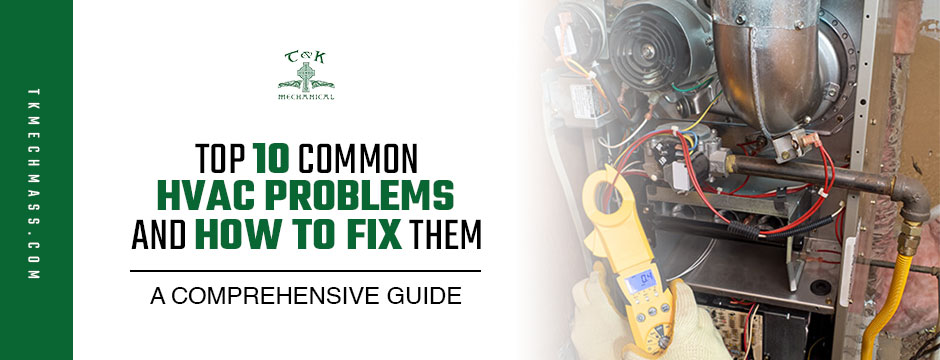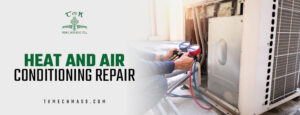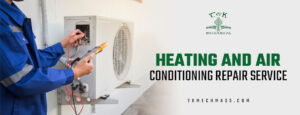A 100% GUARANTEE HEATING, COOLING AND PLUMBING
Mass Save® Loans - 0% Interest. 100% Easy.
We offer 24/7 Emergency Services!
857-234-7783
In every household, the HVAC (Heating, Ventilation, and Air Conditioning) system is a silent hero, working tirelessly to maintain comfort and indoor air quality. However, like any mechanical system, HVAC units are prone to issues that can disrupt their functionality. From faulty thermostats to clogged air filters, these problems can significantly affect your comfort and energy bills. In this guide, we’ll delve into the top 10 common HVAC problems homeowners encounter and provide practical solutions to resolve them. Whether you’re experiencing heating, air conditioning, or ventilation issues, this comprehensive guide by heat and air conditioning repair experts will empower you to troubleshoot and fix your HVAC problems effectively.

One of the most prevalent HVAC problems is dirty or clogged air filters. Over time, these filters accumulate dust, debris, and allergens, restricting airflow and reducing system efficiency.
How To Fix: Regularly checking and replacing air filters every 1-3 months is crucial to ensure proper airflow and system performance. This simple maintenance task can significantly improve indoor air quality and extend the lifespan of your HVAC unit.
A malfunctioning thermostat can lead to temperature inconsistencies and improper heating or cooling. Whether it’s inaccurate readings or unresponsive controls, thermostat issues can disrupt your comfort.
How To Fix: Begin by checking thermostat settings and replacing batteries if needed. Consider upgrading to a programmable or smart thermostat for better control and energy savings. If problems persist, consult a professional HVAC technician to diagnose and repair the thermostat.
Low refrigerant levels due to leaks can result in insufficient cooling and potential compressor damage. Refrigerant leaks not only compromise system performance but also pose environmental and safety hazards.
How To Fix: Schedule a professional heat and air conditioning repair service to detect and repair refrigerant leaks. Certified technicians have the expertise and equipment to safely identify leaks, repair damaged components, and recharge the system with the correct amount of refrigerant.
Faulty wiring, circuit breakers, or electrical components can cause HVAC system malfunctions or complete shutdowns. Electrical problems pose fire hazards and should be addressed promptly by qualified professionals.
How To Fix: Turn off power to the HVAC system and inspect wiring for damage or loose connections. Consult a licensed electrician to diagnose and resolve electrical issues safely. Avoid DIY electrical repairs to prevent accidents and ensure compliance with building codes.
Restricted airflow or low refrigerant levels can cause evaporator coils to freeze, leading to reduced cooling capacity and system inefficiency. Frozen coils not only impair cooling performance but also strain the compressor and other components.
How To Fix: Thaw frozen coils by turning off the system and running the fan. Address the root cause of the issue, such as replacing air filters to improve airflow or repairing refrigerant leaks. Regular maintenance can prevent coil freezing and ensure optimal HVAC performance.
Accumulated dirt and debris on condenser coils inhibit heat transfer and reduce air conditioner efficiency. Dirty coils force the system to work harder, increasing energy consumption and wear on components.
How To Fix: Clean condenser coils annually using a soft brush or vacuum. Remove debris from the surrounding area to maintain proper airflow and maximize heat exchange. Regular coil cleaning improves system efficiency and prolongs the lifespan of your HVAC unit.
Algae, mold, and debris can clog HVAC drainage lines, causing water leaks or moisture buildup. Clogged drain lines not only lead to water damage but also promote mold growth and indoor air quality issues.
How To Fix: As suggested by our heating and air conditioning repair service experts, use a wet/dry vacuum or pipe brush to clear clogged drainage lines. Consider adding algaecide tablets to prevent algae growth and maintain clear drainage. Regular maintenance prevents clogs and ensures proper condensate drainage from your HVAC system.
A malfunctioning blower motor can result in poor airflow, inconsistent heating or cooling, or unusual noises. The blower motor is responsible for circulating air throughout the HVAC system, so any issues can affect comfort and efficiency.
How To Fix: Inspect the blower motor for signs of wear, damage, or excessive noise. Lubricate moving parts as recommended by the manufacturer and replace the motor if necessary. Regular maintenance and timely repairs keep the blower motor functioning optimally and ensure consistent airflow.
Leaky ductwork can waste energy, reduce indoor air quality, and compromise HVAC system performance. Air leaks in ducts allow conditioned air to escape, leading to uneven heating or cooling and increased energy bills.
How To Fix: Seal ductwork leaks using foil tape or mastic sealant to prevent air leaks and improve system efficiency. Consider professional duct sealing services for comprehensive leak detection and repair. Properly sealed ducts optimize airflow and ensure consistent comfort throughout your home.
Neglecting regular HVAC maintenance can lead to increased energy consumption, higher repair costs, and premature system failure. Routine maintenance is essential for preserving system efficiency and prolonging the lifespan of your HVAC unit.
How To Fix: Schedule annual HVAC maintenance with a licensed technician to inspect, clean, and tune up your system. Professional maintenance tasks include checking refrigerant levels, lubricating moving parts, and inspecting electrical components. Regular maintenance prevents costly repairs, improves energy efficiency, and ensures year-round comfort.

By understanding the top 10 common HVAC problems and how to fix them, homeowners can take proactive steps to maintain their HVAC systems and avoid costly repairs or replacements. Whether it’s replacing air filters, cleaning coils, or scheduling professional maintenance, addressing these issues promptly ensures efficient operation and extends the lifespan of your HVAC system. For professional heat and air conditioning repair services, trust the experts at our heating and air conditioning repair service to keep your HVAC system running smoothly year-round. With regular maintenance and timely repairs, you can enjoy reliable comfort and energy savings for years to come.
If you are looking for a reputable HVAC service expert please get in touch with our experts at T&K Mechanical!